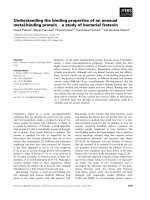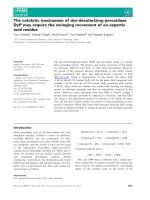the accidental death of an anarchist
Bạn đang xem bản rút gọn của tài liệu. Xem và tải ngay bản đầy đủ của tài liệu tại đây (37.01 KB, 3 trang )
In the play Accidental Death of an Anarchist, Dario Fo expresses his political concerns, using
humour as a way of educating his audience. He incorporates stock characters such as the Maniac
and the superintendent to address issues like abuse of power, while using farce and satire to
emphasize his point. All of these combined help to leave the responder thinking about the issues in
contemporary society.
The Maniac has the main and most important role in ADOA. He can be likened to the Commedia
Dell'arte character Arlecchino as both are very intelligent, but also unpredictable and known to
frequently change their plans. Through the Maniac the audience learns the truth about the death of
the anarchist.
The Maniac constantly changes his character in the play, representing the deception and disguise
of the police force and emphasizing how ridiculous those in power are. In Act One, Scene Two,
the Maniac says, "I'm not pushing. You've been seized by a raptus." This is a great comic line; the
irony in the remark shows how absurd the police's statements are.
Another example is when the Maniac's arm falls off and he mockingly states: "Next you'll be
pulling off my leg." This is a deliberate farce to make the responder laugh. This incident is also a
symbol of the cover-ups made by the police and is aimed at stressing Dario Fo's message about the
injustices and lies by the police in society.
The Maniac is very intelligent and this helps him to control the authoritative figures and make
them out to be foolish and weak. For example: In Act One, Scene Two, he points to a nervous
twitch in his neck. This is comic because he is threatening the police with something that couldn't
possibly cause them any harm. It also reflects how successfully he has asserted his status over the
others.
The end of Act One, Scene Two is a powerful irony with the Maniac convincing the police
officers to sing an anarchist song about liberty for the people, to prove that they have a
compassionate side- "People would be happy to forgive all of your cretinous blunders if they
could see two decent human beings behind it all." This is an effective ironic statement and in
agreeing to do this they're only further proving the hypocritical nature of those in power to the
audience.
In both of these examples, Fo tries to make a political argument aimed at the audience, that is, that
the majority people should have power over the minority.
The Maniac convinces the police to re-write their version of events; thus making them look like
fools. "You know what I say You mean draw up a third version?" (Act One Scene Two). Here he
uses irony to satirize police conduct, again reinforcing Fo's idea that people in power know
nothing. By making the audience laugh, Fo is also able to become closer to them, making his
political views more important.
The Maniac's lines at the end of the play- "Whichever way it goes, you see, you've got to
decide"-emphasizes the point Fo makes about the fact that there are always different outcomes
possible for any event. This non-cathartic ending is also important because it allows for political
debate, encouraging the audience to take action.
As you can see, the Maniac is used as a decoy character, where he appears to be mad, but becomes
normal, while everything else is abnormal. He helps to point out the farcical lengths the Italian
police went to in order to exonerate themselves from any responsibility for the death of the
anarchist.
The Superintendent is one of the main characters in ADOA. He is cynical and sarcastic and is
always offering advice. His character is a lot like that of Brighella in the Commedia Dell'arte. He
represents the police force as he is in charge (or supposed to be) in the play.
The Superintendent is not merely a caricature. He reflects the abuses of police power that were
occurring at the time and still are. This is quite obviously shown in Act One, Scene Two when he
speaks about the statement made by the police- " more like a 'correction'". He tries to 'purge' their
mishappenings, using a neutral euphemism for an unpleasant subject. This stirs anger within the
responder, while making them laugh at how openly and confidently the Superintendent expresses
his corruption.
The Superintendent heightens the comedy in the play and is made to be oafish and completely
unaware by Fo, contradictory of someone who is meant to be learned. In Act Two, Scene One, the
Superintendent exclaims " your Honour, you're taking the piss." Not only does this expose the
police's disrespect for the law and it's proceeding through the use of his farcical comment, but it is
also ironic that what he has said is such an understatement. The Superintendent is unable to grasp
what the Maniac is up to. By showing the audience his 'raw' stupidity, Dario Fo helps the
responder to come to the realisation that there are actually people like this in positions of power.
The police's controverting actions are continually presented through the Superintendent-"So he's
a hoaxer, an imposter, a quick-change artist." The irony here is that the police have actually
demonstrated that they're the "hoaxers" and "quick change artists" in regards to the number of
times that they have changed their evidence. This irony creates a humorous side to the critical
issue of police corruption while reinforcing the idea that what happened was a serious political
amalgamation of lies aimed at hiding the truth behind the anarchist's death.
There were many themes presented in ADOA including that of the abuse of power by the
authoritarian. This occurs when a person with a higher status uses the role in a negative way.
Abuse of power often occurs for personal gain and achievement.
The characters in Dario Fo's play in some way or another reflect this theme through their actions
and/or words. For example, Feletti uses her position as a journalist to gain money and improve her
status. Maniac: "You are a journalist but what will you achieve? A huge scandal " Feletti: "Not
a bad day's work." (Act Two, Scene Two) This line helps the audience to see Feletti as someone
who is two-faced, pretending to do what's in the interests of the public, but having the underlying
knowledge that a good story will get her 'big bucks'. This is exactly the way Fo views journalists.
The Maniac in this case is used to point out how far individuals will go for their own benefit.
The Maniac's different disguises are used to emphasize the stupidity of the law and to show that
corrupt people are often hidden within respectable government bodies. For example: In Act One,
Scene One, the Maniac tries on different disguises asking the audiences opinion- " No? All right
forget it. What about the anarchist in Rome? No? (Disguised as the judge) Thirty years for
you, forty for you, forty for you etc " By breaking down the fourth wall, the audience becomes
co-conspirators, and part of the political conspiracy. Through the Maniac's exaggerated and comic
view of the court system, the responder also becomes aware of the theme stated above aswell as
Fo's political message.
ADOA is in itself a farce and is used to present a political view without lecturing the audience.
Dario Fo extensively uses techniques such as slapstick and satire to add to the comic effect of the
play. In doing so he is more easily able to get his political opinion across to the audience.
Slapstick is successfully used to express real issues such as the anarchist's death. As the audience
comes closer to the truth about the death, the slapstick comedy provides a macabre contrast with
the underlying seriousness. For example: In Act Two Scene One Bertozzo comes towards the
Maniac, infuriated, but slips on the glass eye and falls. This incident helps to take some of the
tension away from the scene by making the audience laugh.
Act One Scene One is critical because it sets the scene of the death of the anarchist. Again
slapstick is used to relieve the audience when the Maniac begins acting like a dog, sniffing at the
floor. He also uses physical comedy when he slaps and kicks the police officers. This is an
unexpected thing for the audience to see and so it adds to the humour.
Fo also uses satire in real situations and characters to present his view of the truth i.e. the Italian
police and the corrupt nature of society. This is shown when the Maniac ridicules the police by
burning and throwing out documents, mocking the way the police destroy evidence. By using
satire, Fo creates a humorous atmosphere, while showing the audience that political issues aren't
being dealt with properly and that the responder has the ability to change things.
In summing up, Dario Fo uses a combination of Commedia characters, important political themes
and performance techniques to both entertain and inform his audience. Accidental Death of an
Anarchist creatively uses a comic, grotesque and satirical style to avoid any catharsis, thus
stimulating the audience towards political change. By incorporating 'laughter as a political
weapon' Fo is able to successfully 'educate his audience' about the political issues that can still be
related to society today.









